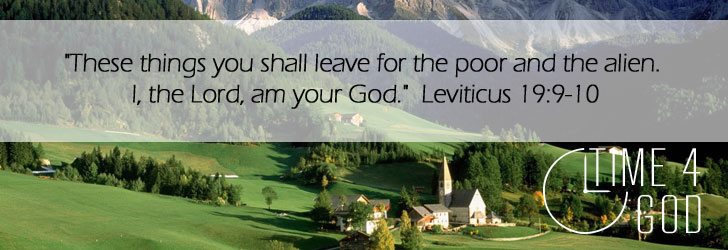A More Moral Way of Life
The book of Leviticus deals with matters like: sacrifices and offerings, purity and holiness, the priesthood, the operation of the sanctuary, and feast days. But it is also interested in matters of human behavior, ethics and economic issues.

The book of Leviticus, which gets its name from ancient Greek translators, due to the fact that much of it deals with the concerns of priests who are of the tribe of Levi, continues the Exodus narrative, but also deals with cultic matters like: sacrifices and offerings, purity and holiness, the priesthood, the operation of the sanctuary, and feast days. But it is also interested in matters of human behavior, ethics and economic issues. It deals with the laws of Moses, but the goal here is not merely legislative. It is, rather, a system and an attempt to inculcate a way of life into its readers and hearers; a way of life that is moral, generous, and oriented to God.
We see an example of that here in the passage above. Once again, the message is being revealed through a pastoral image. Farming was the economy of those times. Everything was supported by farming, both in the countryside where the crops were produced and in the villages, towns and cities. Anyone who has been a farmer knows that no matter what one knows about the soil and the best way to grow crops, or to husband animals, is often overthrown by the unpredictability of the elements. Will there be the proper amount of moisture and sun, or will there be drought conditions? These are the constant concern for farmers. Farming is a gamble, one that farmers take out of need, both for sustenance and for income.
[content-ad]
Here the writers of the Book of Leviticus, inspired by the Holy Spirit, are adding a moral, and an ethical dimension to the economy of farming. It is not just about you. It is not just about money. We are to remember that the poor are with us, that there are foreigners, ʺaliensʺ among us that own no property, who can not support themselves and who temporarily need our help. ʺWhen you reap the harvest of your land, you shall not be so thorough that you reap the field to its very edge, nor shall you gather the gleanings of your harvest. Likewise, you shall not pick your vineyard bare, nor gather up the grapes that have fallen. These things you shall leave for the poor and the alien. I, the Lord, am your God.ʺ
I know a successful farmer who plants a variety of crops over about a thousand acres of good, irrigated land in the Yakima Valley of Washington State. When the time of harvest comes, he practices this very ʺlawʺ written about in Leviticus. For example, when he harvests his potato fields, he does not go back into the fields to glean the thousands of excellent potatoes that the mechanical harvesters missed because of their size, or by accident. He leaves them for his workers and for anyone else, particularly the poor, to collect for themselves. It does not hurt him economically to do this, but that is not part of his calculations in this matter. He does it because he recognizes the call of God in this practice. He believes that his surplus is all a graceful gift from a generous God and he gives thanks for that by ʺleaving his gleanings for the poor and the alien.ʺ This is the attitude that the ʺlawʺ from Leviticus about farming is meant to build in the readers and listeners of ancient Israel—and us.
Everything we have, whether it is the product of our talents and knowledge, or that which comes to us by happenstance, or present circumstances, is a gift of God. In reality, nothing belongs to us, not even our own lives. Because we have life, because we have talents, or economic security, we are to steward it all, not just for ourselves, but for the good of those we love, and those we have a fellow-duty towards, like the poor and the aliens among us. By recognizing this truth and living out of it, we are giving proper thanks to God for his loving generosity towards us. We are fulfilling our duty to serve the poor among us. We are living in accord with the liberating and empowering, the life-giving law of God. In this we are becoming more fully human, more holy and, therefore, more truly happy in this life.
SKM: below-content placeholderWhizzco for FHB

